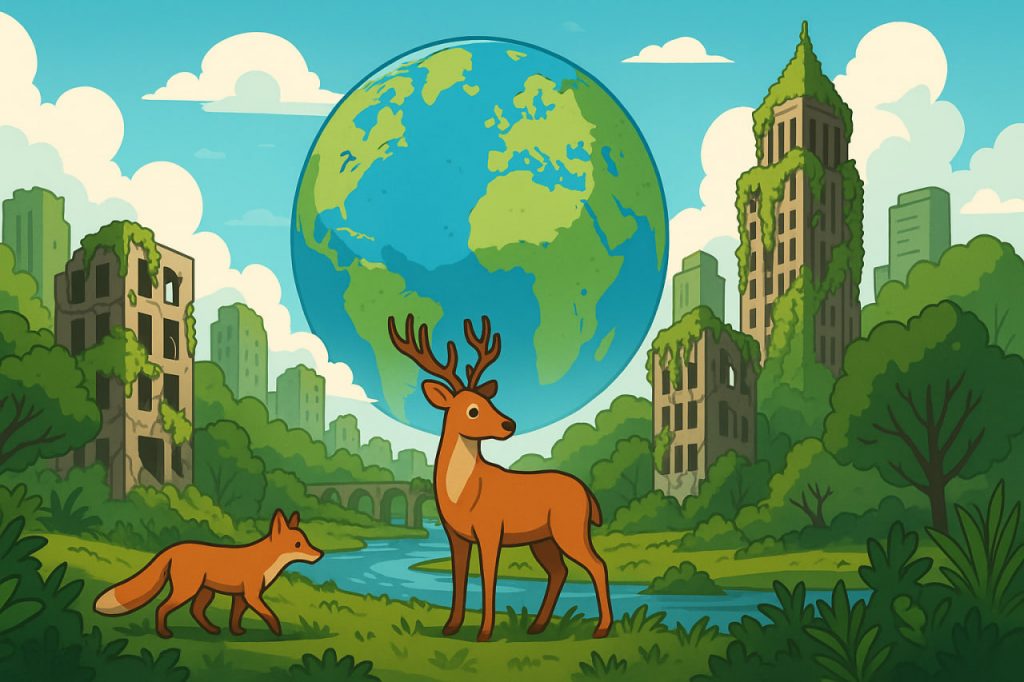The question of whether Earth would be better off without humanity is one of the most thought-provoking in modern science and philosophy. On one hand, humans are responsible for extraordinary achievements — art, science, and technology that transformed the planet. On the other, human activity has caused deforestation, mass extinctions, and climate change. Imagining an Earth without us is not only a moral reflection but also a way to understand our role in maintaining — or destroying — natural balance.
The World Without Humanity
If humans suddenly disappeared, Earth’s natural systems would begin to heal almost immediately. Within a few days, the noise of cities would fade, pollution would start to decline, and wildlife would cautiously reclaim urban areas. In a few months, air and water quality would significantly improve. After a few decades, forests would grow over abandoned towns, and animals would return to regions once dominated by humans. In geological terms, Earth would gradually erase most traces of human presence.
Environmental Recovery
Scientists estimate that within 100 to 300 years after humanity’s disappearance, most man-made structures would collapse, and ecosystems would restore themselves to pre-industrial levels. The atmosphere would regain balance as CO₂ levels decreased naturally. Species now endangered by hunting, habitat loss, and pollution could repopulate and diversify again. Nature, resilient and self-regulating, would begin to rebuild what human civilization dismantled.
The Dark Legacy of Humanity
Yet, even if humanity vanished, our legacy would remain for thousands — even millions — of years. Plastic waste, nuclear materials, and chemical pollutants would persist in the environment. Artificial satellites orbiting Earth would slowly decay, and the carbon footprint from centuries of industrialization would continue affecting the climate for generations. In short, Earth could recover, but it would bear the scars of our existence long after we were gone.
What Humans Contributed
Despite the harm, humanity has also created beauty and understanding. We are the only species known to explore the universe, preserve life through science, and reflect on our impact. Humans have developed conservation programs, renewable energy, and reforestation efforts that restore damaged ecosystems. AI, satellites, and global cooperation now help monitor climate health more effectively than ever before. Our capacity for awareness gives us a unique chance not to disappear — but to coexist harmoniously with nature.
Lessons for the Future
The idea of a humanless Earth should not inspire despair but responsibility. It shows that the planet doesn’t need saving — we do. Nature will continue without us, but whether we remain a part of it depends on our choices today. By reducing waste, transitioning to clean energy, and protecting biodiversity, humanity can shift from being a burden to being a steward of life.
Interesting Facts
- If humans vanished, domestic animals would quickly adapt or merge with wild species.
- Some cities, like Pripyat (Chernobyl), already show how nature reclaims human spaces.
- The carbon dioxide from the industrial era would linger in the atmosphere for at least 10,000 years.
- Coral reefs and rainforests could fully recover within a few centuries without human interference.
Glossary
- Carbon footprint — the total amount of greenhouse gases produced by human activity.
- Biodiversity — the variety of all living species in an ecosystem.
- Reforestation — the process of replanting trees to restore forests.
- Pollutant — a harmful substance released into the environment.
- Sustainability — the ability to maintain balance between human needs and ecological health.


